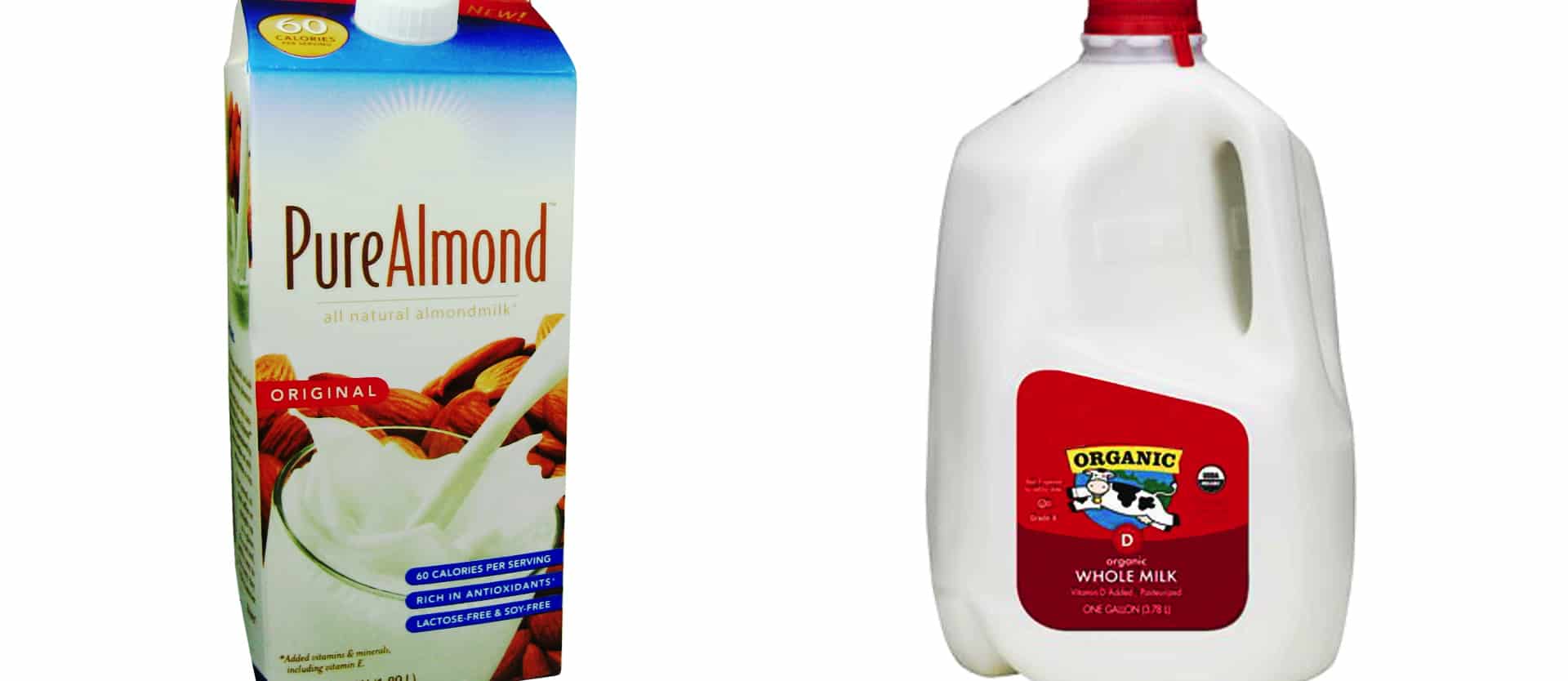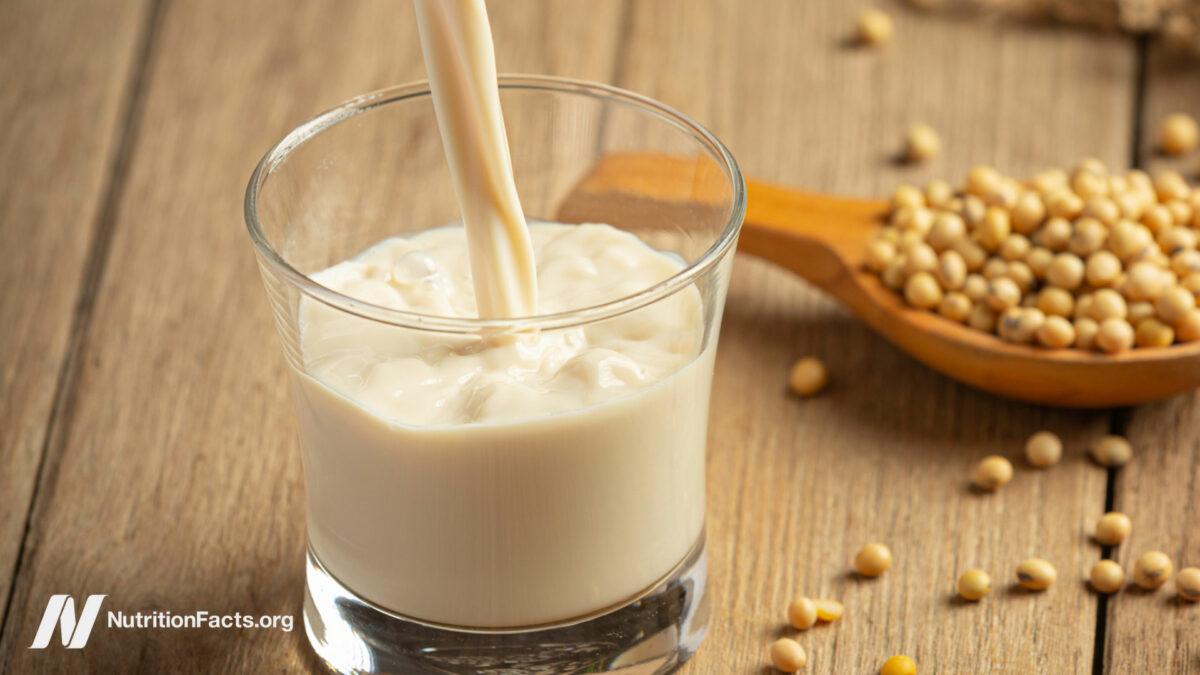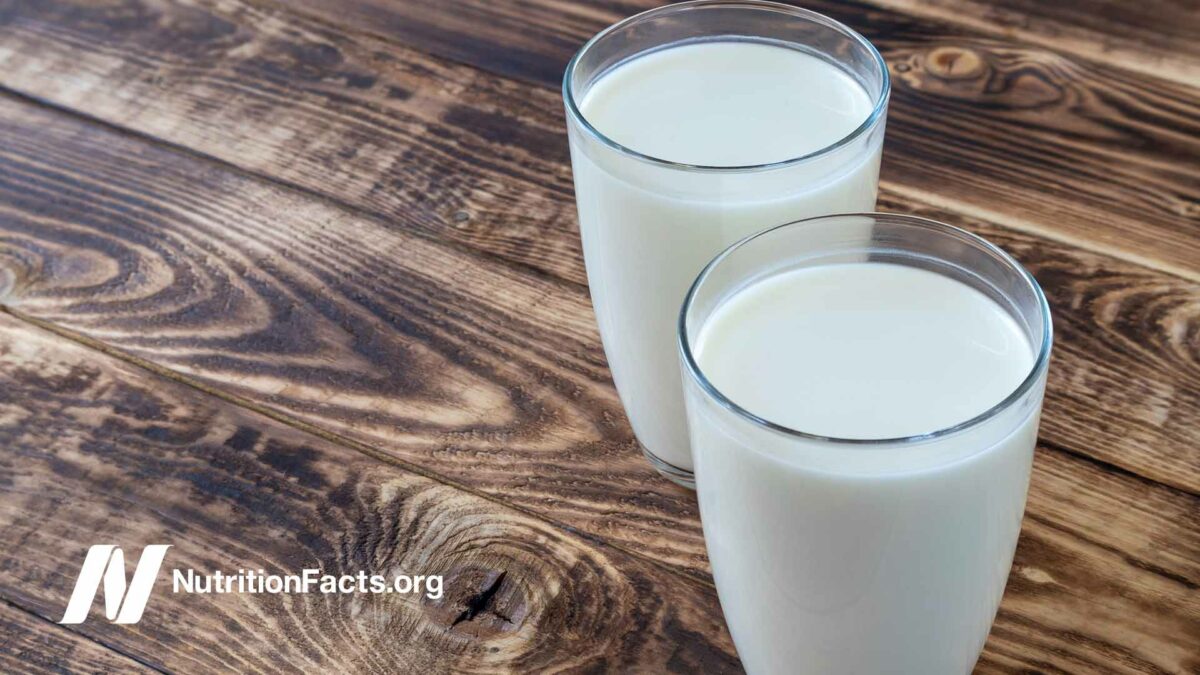
Almond Milk
Is almond milk more healthful than dairy milk? Is unflavored and unsweetened almond milk preferable to sweetened vanilla almond milk?
Milk from Almonds vs. Milk from Cows
Almond milk is more healthful than dairy milk, which contains saturated animal fat, cholesterol, and hormones. Cows’ milk has been found to stimulate the growth of prostate cancer cells in vitro, for instance, producing an average increase in cancer growth rate of more than 30 percent. In contrast, almond milk suppressed the growth of these cancer cells by more than 30 percent.
Sweetened vs. Unsweetened Almond Milk
The difference between these two types of almond milk is added sugar in the sweetened variety. In general, I favor cutting down on the intake of empty calories whenever possible. Since we get only about 2,000 in our calorie bank each day, why not make each one count? But, if the only way you’ll drink green tea is with sweetened almond milk, then, overall, it would be healthier for you to choose the variety with added sugar. (Your taste buds would likely adapt to the unsweetened kind, though, so give it a try for a couple weeks.)
Is Almond Vanilla Milk Good for You?
Many almond milks are fortified with calcium, vitamin D, and vitamin B12, which benefit us, but what about the vanilla? That’s an interesting question.
Given vanilla’s popularity, I was surprised to find that there isn’t much science published on the health effects of vanilla orchid fruit phytonutrients. There are two in vitro studies that suggest vanillin, one of the many aromatic compounds in vanilla, may be protective against colorectal and cervical cancers, but, to my knowledge, no clinical or epidemiological studies have been published.
The most unusual study on vanilla may be one that was published out of Germany in 1999. Researchers wanted to know if our olfactory memory goes back even further than our verbal memory. Do we subconsciously remember tastes and smells from our infancy before we could even put them into words? There was a time when certain German infant formulas were flavored with vanilla, so the researchers challenged a group of adults with a vanilla-containing food. Since they couldn’t just use a typical vanilla-flavored confection as it could introduce too many other new variables, they had to choose something no one would have ever associated with vanilla, so they concocted a vanilla-flavored ketchup. Their findings? Two-thirds of those who had been bottle-fed with vanilla-flavored formula as infants preferred the vanilla ketchup, whereas two-thirds of the those who hadn’t been exposed to vanilla at that early age chose the regular ketchup.
Are There Any Downsides to Almond Milk?
Many almond milks available to us in grocery stores often contain added salt and thickeners of questionable safety, such as carrageenan. (For more on that, see my video Is Carrageenan Safe?.)
Kids shouldn’t drink too much almond milk. There have been a few case reports of young children drinking four cups a day and running into problems with kidney stones due to almond milk’s relatively high oxalate content, which averages about five times more than soy milk.
Making Almond Milk at Home
It’s so easy to make your own almond milk. Simple add 2 tablespoons of smooth, raw almond butter and 2 cups of water in a high-speed blender, then blend until smooth. Transfer the almond milk to a glass bottle or jar with a tight-fitting lid, and chill until ready to serve. Shake well before using and enjoy.
For substantiation of any statements of fact from the peer-reviewed medical literature, please see the associated videos below.
Image Credit: naito8 / Thinkstock. This image has been modified.
Popular Videos for Almond Milk


Is Soy Milk the Most Nutritious Non-Dairy Milk?
Soy milk is compared to dairy milk and other plant-based milks.
Does Adding Milk Block the Benefits of Coffee?
How to choose the healthiest coffee, and the effects of adding milk vs. soymilk.
Almonds for Osteoporosis
What happens when you take blood from people before and then again four hours after...
Which Nut Fights Cancer Better?
Within hours the blood of those fed walnuts is able to suppress the growth of...
Childhood Constipation and Cow’s Milk
The elimination of all dairy products was found to cure constipation in up to 100%...
Is Milk Good for Our Bones?
The galactose in milk may explain why milk consumption is associated with significantly higher risk...All Videos for Almond Milk
-

The Downside to Banana Smoothies for Polyphenol Absorption
An enzyme in bananas can destroy some of the phytonutrients in berries and cocoa, but there is a way to reduce the effect.
-

Is Soy Milk the Most Nutritious Non-Dairy Milk?
Soy milk is compared to dairy milk and other plant-based milks.
-

Dairy and Cancer
How do we explain the increased risk of prostate cancer but the decreased risk of colon cancer associated with dairy consumption?
-

How the Dairy Industry Designs Misleading Studies
How the meat and dairy industries design studies showing their products have neutral or even beneficial effects on cholesterol and inflammation.
-

Dining by Traffic Light: Green Is for Go, Red Is for Stop
In this video, I explain my traffic light system for ranking the relative healthfulness of Green Light vs. Yellow Light vs. Red Light foods.
-

Arsenic in Rice Milk, Rice Krispies, & Brown Rice Syrup
I recommend people switch away from using rice milk.
-

Prostate Cancer and Organic Milk vs. Almond Milk
Does the hormonal stimulation of human prostate cancer cells by cow milk in a petri dish translate out clinically in studies of human populations?
